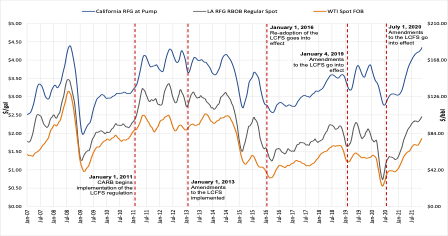PRESS RELEASE
FOR RELEASE ON: May 10, 2022
Contact: Gary Meltz, Meltz Communications
Email: gmeltz@meltzcommunications.com
Phone: 202.365.7085
NEW STUDY FINDS GOLDEN STATE DRIVERS SAVE BIG ON CLEAN FUELS – LIKE E85 PRODUCED BY AMERICAN FARMERS – UNDER CALIFORNIA’S LCFS
In California, the Single Biggest Driver of Fuel Costs is the Price of a Barrel of Oil
LCFS is Successfully Opening the Market and Decarbonizing California’s Transportation Fuels
Sacramento, Calif — As the nation grapples with skyrocketing gas prices, the Low Carbon Fuels Coalition (LCFC) is excited to announce a new study that conclusively determined that California drivers are saving money by using clean fuels induced under the Low Carbon Fuels Standard. The study also found that the primary and controlling driver of fuel costs in the Golden State is the price of a barrel of oil which motorists across the country are witnessing daily. The study, performed by Bates White, is a comprehensive analysis of California’s Low Carbon Fuels Standard, how it has impacted gasoline prices there, and rapidly begun to decarbonize the state’s transportation fuels.
“This study is proof positive that a Low Carbon Fuels Standard can decarbonize transportation fuels, while at the same time offering drivers lower cost alternatives to petroleum like E85 produced by American farmers that is currently selling at $1.50 less per gallon than gasoline,” said Graham Noyes, Executive Director of the LCFC. He added: “We are supporting Clean Fuels Standards across the nation and a federal level, and have demonstrated how successful this program is in California. Without a LCFS, drivers in my home state would be paying more for transportation fuels, and creating more pollution.”
From the Executive Summary:
The controlling driver of fuel price movements is the cost of crude oil with 71% of the variation in retail cost explained by the cost of crude.
Other California-specific factors, such as taxes and the Cap-and-Trade Program for greenhouse gas emissions have readily-quantifiable impacts on retail fuel prices and explain why California has the second highest gasoline prices in the nation. The combination of crude oil price, Cap-and-Trade costs and taxes explains fully 90% of regular gasoline pricing over time.
An examination of historical data on the components of retail gasoline prices in California shows that the residual “unexplained” price, which encompasses all pricing factors that cannot be directly quantified, has grown in recent years, but is not linked to the implementation of LCFS or administration of the program over time. Compared to the four years prior to LCFS implementation, the first four years of the program saw a decrease in the margin of retail gasoline price over wholesale spot price, indicating clearly that LCFS was not responsible for increasing retail prices.
From a consumer perspective, renewable fuels induced under the LCFS program currently provide cost savings relative to petroleum fuels. In particular, renewable diesel and E85 provide lower-cost alternatives to petroleum diesel and gasoline, respectively. Consumers can avoid any potential LCFS-related cost, and indeed enjoy a net benefit from lower fuel prices, by accessing these alternative fuels.
The California LCFS Program has induced substantial growth and diversification in alternative transportation fuels, including electricity, that mitigate compliance costs and also reduce price impacts by increasing the volume of fuel in the market.
An assessment of observed market prices shows conclusively that the LCFS program price effect at the pump is not a significant driver of retail fuel prices in California. Though retail fuel prices in California are high relative to other states, there is no statistically significant correlation between the price of LCFS credits and the price of retail gasoline.
Table showing California’s Fuel Prices Are Determined by The Cost of a Gallon of Oil

